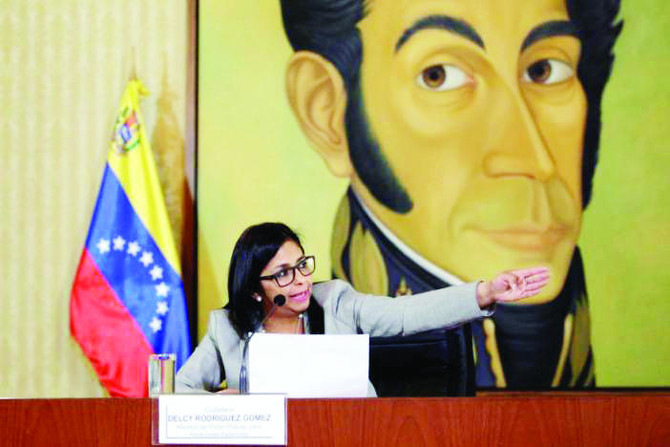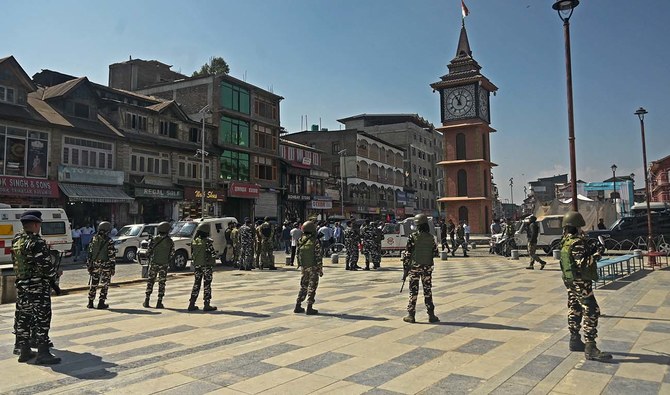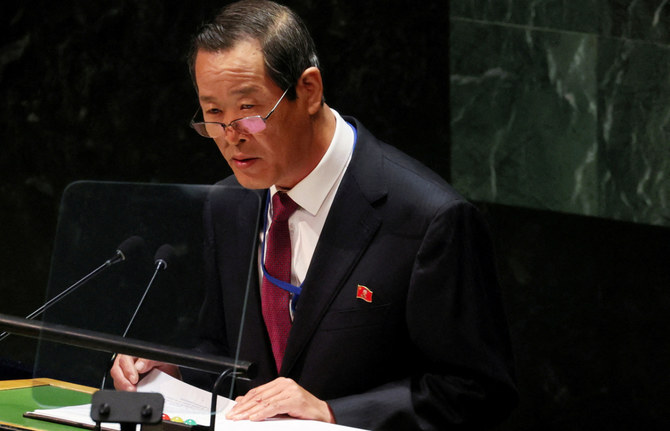BRASILIA: Venezuela’s foreign minister hit out this week against both Peru and Brazil, calling Peru’s president a “servile dog of US imperialism,” and slamming Brazilian politicians for all being allegedly corrupt.
On March 6, Delcy Rodriguez told a seminar in Caracas that Peru’s President Pedro Pablo Kuczynski “goes round, poor thing, with my respect because he is an elderly man, (like) a good dog who wags its tail at the empire and asks for an intervention in Venezuela. He’s alone, going round like a crazy man, with no one paying attention.”
Kuczynski, who is 78 years old, was elected president last year after spending years in New York as a Wall Street banker. He became a naturalized US citizen during his time there, and renounced his American citizenship before being elected president of Peru. He is also a vocal critic of Venezuela and the Chavismo policies practiced by the current government of President Nicolas Maduro, which are a continuation of the leftist policies started by the late-President Hugo Chavez.
Rodriguez was reacting to a speech that Kuczynski gave recently on an official visit to the US in which he said Latin America was in general like a well-behaved dog sitting on the carpet except for Venezuela, which “was a big problem.” He was the first Latin American leader to meet with US President Donald Trump in the White House on Feb. 24.
Rodriguez next hit out at Brazil on the same day, saying that the country had become a global shame ever since Michel Temer took over the presidency last year. “Today we must say, lamentably, that Brazil is a global shame. Ever since they undertook a coup d’état against Dilma Rousseff, every day their politicians are involved in scandals,” reported the Veja newsweekly. She also said that Brazilian politicians were corrupt, “but they do not care as the imperialist Right wing extends the red carpet for them.”
On March 7, the new Brazilian minister of foreign affairs, Aloysio Nunes, hit back at Rodriguez at his swearing-in ceremony, saying that she was not important. “She doesn’t have much importance. In this country of hers, the most important people are the jail guards, and not the minister of foreign affairs,” Nunes said.
Rodriguez responded on social media by saying that Nunes had started out on the wrong foot with Venezuela, and sarcastically noted that she would send him the ABC of Diplomacy. She also said that Nunes should mirror his predecessor who left because of corruption accusations against him. She was referring to Jose Serra, a close ally of Nunes and a member of the same political party, who recently resigned and returned to the Senate claiming he was doing so for health reasons. Serra’s name has been mentioned in the Car Wash corruption investigation as allegedly having accepted millions of reais in illegal campaign donations when he ran for the presidency of Brazil in 2010. Serra denies it.
Nunes, who until this week was a leading senator of the right-leaning PSDB political party, has long been a tough critic of Venezuela’s jailing of opposition politicians. Last year in June he led a delegation of Brazilian senators on a surprise visit to Caracas to try and visit jailed Venezuelan opposition leaders. The Maduro government strongly objected to their visit as interference in its internal affairs and ordered police and military troops to block their exit from the airport. In the end, the Brazilian senators returned defeated to Brazil without having been able to visit the prisoners.
Venezuela’s lashing out at its neighbors has not surprised observers. “Given that Venezuela’s government behaves diplomatically as if it had little to lose, it is likely that the Venezuelan foreign minister decided to play chicken with Brazil,” said Guilherme Casarões, professor of international relations at ESPM and FGV in São Paulo, in an interview with Arab News. “They probably expect Brazil’s newly-appointed foreign minister, Aloysio Nunes, to lose his temper and try to hit back at Venezuela, forcing the countries into a diplomatic crises that may well serve the Maduro regime.”
Venezuela, which has the world’s largest known reserves of oil and earns 90 percent of its income from oil exports, has been struggling with an economy that has suffered much since the international price of oil plunged a few years ago. The change of governments in Argentina, Peru and Brazil, which were until recently headed by left-wing populists, has also left Venezuela feeling more isolated in the region. But Casarões believes that Maduro’s government faces bigger challenges than just being isolated.
“Maduro’s greatest challenge is the dire economic situation in Venezuela, not diplomatic isolation,” said Casarões. “He surely benefitted from the incumbent left-wing governments in the neighborhood, for they fostered Venezuela’s integration into the Mercosur, but the rollback of leftist presidents only helps expose the country’s reality even further. Moreover, even before Rousseff’s impeachment, the Brazilian government was already adopting a firm position against human rights violations in Venezuela, not to mention that bilateral trade flows have been in steep decline since at least 2012.”
Negotiations between the opposition and the Maduro regime have come to a standstill after even the Vatican was unable to achieve to breakthrough. Being the largest and richest country of the continent means that Brazil should have been the natural choice to help iron out a political deal in Venezuela, but that is no longer the case since Temer became president. Maduro was a close ally of the leftist Worker’s Party of Rousseff, but now that she is out of power, there has been no love lost between the Brazilian and Venezuelan governments.
“Brazil cannot play the role of honest broker while President Temer remains in office,” explained Casarões. “It would demoralize Venezuela’s charges of a coup d’état in Brazil, and it would hurt the interests of many supporters of the current Brazilian administration, who have voiced a strong anti-Venezuelan sentiment on ideological grounds. This is unfortunate because Brazil –alone or through regional organizations such as Mercosur and Unasur –has played a crucial role as the center of gravity of South America for the last three decades. And I don’t think that extra-continental actors have enough interest or legitimacy to mediate a smooth transition, or a national pact, in Venezuela.”
Venezuela isolated in war of words with neighbors
Venezuela isolated in war of words with neighbors

Suspected Kashmir rebels kill Indian air force corporal

- Suspected rebels ambushed military convoy in Indian-administered Kashmir, Indian Air Force says
- Since 1989, rebel groups opposed to Indian rule have waged insurgency in disputed territory
SRINAGAR, India: An Indian air force member was killed and four more injured when suspected rebels ambushed a military convoy in Indian-administered Kashmir, an official statement said, as campaigning for national elections continues in the disputed territory.
The convoy was attacked by an unknown number of armed militants who sprayed automatic rifle fire toward at least one air force truck in the mountainous Poonch area, 200 kilometers (124 miles) south of the main city of Srinagar, the air force said in a statement.
Five air force personnel were hit in the firefight late Saturday and “one Air Warrior succumbed to his injuries later,” it said, identifying the dead man as a corporal.
A neighboring constituency took part in the first phase of India’s general election on April 19, and Poonch voters were originally scheduled to cast their ballots this week but the Election Commission of India has postponed the polling to May 25 because of inclement weather in recent days.
Kashmir has been divided between India and Pakistan since their independence in 1947, with both claiming the high-altitude territory in full but administering it in parts.
Since 1989, rebel groups opposed to Indian rule have waged an insurgency in Indian-controlled Kashmir, demanding either independence or a merger with Pakistan.
The conflict has left tens of thousands of civilians, soldiers and militants dead.
Rebel activity in the territory has registered an uptick since last month as campaigning for the elections picked up in the restive region.
In April, three suspected rebels were killed and a police officer and three soldiers wounded in three separate clashes across the territory.
Violence has drastically dropped since 2019, when Prime Minister Narendra Modi’s government revoked the region’s limited autonomy and stepped up a security chokehold.
Voting in India’s six-week-long national election, which started last month, will end on June 1.
Driver dies after crashing into White House perimeter gate, Secret Service says

- The driver was not immediately identified
WASHINGTON: A driver died after crashing a vehicle into a gate at the White House Saturday night, authorities said.
The driver was found dead in the vehicle following the crash shortly before 10:30 p.m. at an outer perimeter gate of the White House complex, the US Secret Service said in a statement.
Security protocols were implemented but there was no threat to the White House, the agency said.
The driver was not immediately identified.
The Secret Service will continue to investigate the matter, while turning over the fatal crash portion of the investigation to the Washington Metropolitan Police Department, the agency said.
Fake videos of Modi aides trigger political showdown in India election

- Indian police arrest nine people for circulating fake video of Indian Home Minister Amit Shah
- With more than 800 million Internet users, tackling misinformation in India is a huge challenge
BENGALURU/LUCKNOW: Manipulated videos are taking center stage as campaigning heats up in India’s election, with fake clips involving two top aides of Prime Minister Narendra Modi triggering police investigations and the arrest of some workers of his rival Congress party.
In what has been dubbed as India’s first AI election, Modi said last week fake voices were being used to purportedly show leaders making “statements that we have never even thought of,” calling it a conspiracy “to create tension in society.”
Indian police — already investigating the spread of fake videos showing Bollywood actors criticizing Modi — are now investigating a doctored online clip that showed federal home minister Amit Shah saying the ruling Bharatiya Janata Party will stop certain social guarantees for minorities, a subject sensitive for millions of voters.
Shah retorted on X, posting his “original” and the edited “fake” speech and alleging — without providing any evidence — that the main opposition Congress was behind the video it created to mislead the public. The minister said “directions have been issued to the police to address this issue.”
Indian police arrested at least nine people, including six members of Congress’ social media teams, in the states of Assam, Gujarat, Telangana and New Delhi last week for circulating the fake video, according to police statements.
Five of the Congress workers were released on bail, but the most high-profile arrest made by the cybercrime unit of New Delhi police came on Friday, when they detained a Congress national social media coordinator, Arun Reddy, for sharing the video. New Delhi is one region where Shah’s ministry directly controls police. Reddy has been sent into three-day custody.
The arrest has sparked protests from Congress workers with many posting on X using the #ReleaseArunReddy tag. Congress lawmaker Manickam Tagore said the arrest was an example of “authoritarian misuse of power by the regime.”
Congress’ head of social media, Supriya Shrinate, did not respond to messages and an email seeking comment.
MISINFORMATION
India’s election from April 19 to June 1 will be the world’s largest democratic event. With nearly a billion voters and more than 800 million Internet users, tackling the spread of misinformation is a high stakes job. It involves round-the-clock monitoring by police and election officials who often issue take down orders to Facebook and X as investigations start.
In India’s most populous state of Uttar Pradesh, more than 500 people keep tabs on online content, flagging controversial posts and coordinating with social media companies for their removal when needed, police chief Prashant Kumar told Reuters on Saturday.
Another fake video that sparked a storm last week showed Yogi Adityanath, the state’s chief minister, criticizing Modi for not doing enough for families of those who died in a 2019 militant attack. Though fact checkers said the video was created using different parts of an original clip, state police called it an “AI generated, deepfake.”
Using Internet address tracking, state police arrested a man named Shyam Gupta on May 2 who had shared the fake video post on X a day earlier, receiving over 3,000 views and 11 likes.
The police have accused Gupta of forgery and promoting enmity under Indian law provisions that can carry a jail term of up to seven years if convicted. Reuters could not reach him as he is currently serving a 14-day custody period.
“This person is not a tech guy. Had he been tech savvy, arresting him quickly would not have been possible,” said police officer Kumar.
Australian police shoot boy dead after stabbing with ‘hallmarks’ of terrorism

SYDNEY,: Australian police said on Sunday they had shot dead a boy after he stabbed a man in Western Australia’s capital Perth, in an attack authorities said indicated terrorism.
There were signs the 16-year-old, armed with a kitchen knife, had been radicalized online, state authorities said, adding they received calls from concerned members of the local Muslim community before the attack, which occurred late on Saturday night.
The attack, in the suburb of Willetton, had “hallmarks” of terrorism but was yet to be declared a terrorist act, police said.
“At this stage it appears that he acted solely and alone,” Western Australia Premier Roger Cook told a televised press conference in the state capital Perth, regarding the attacker.
The victim, stabbed in the back, was stable in hospital, authorities said.
Prime Minister Anthony Albanese said he had been briefed on the incident by police and intelligence agencies, which advised there was no ongoing threat.
“We are a peace-loving nation and there is no place for violent extremism in Australia,” Albanese said on social media platform X.
The incident comes after New South Wales police last month charged several boys with terrorism-related offenses in investigations following the stabbing of an Assyrian Christian bishop while he was giving a live-streamed sermon in Sydney, on April 15.
The attack on the bishop came only days after a stabbing spree killed six in the Sydney beachside suburb of Bondi.
Gun and knife crime is rare in Australia, which consistently ranks among the safest countries in the world, according to the federal government. (Reporting by Sam McKeith in Sydney; Editing by Christian Schmollinger and William Mallard)
North Korea’s UN ambassador says new sanctions monitoring groups will fail

- Earlier this year, Russia vetoed the annual renewal of a panel of experts amid US-led accusations that North Korea has transferred weapons to Russia for use in its war in Ukraine
SEOUL: Efforts led by the US and other Western countries to form new groups to monitor sanctions on North Korea will fail, the country’s UN envoy said on Sunday, according to state media KCNA.
Ambassador Kim Song made the comment in response to a joint statement the US and its allies issued this week calling to continue the work of a UN panel of experts monitoring longstanding sanctions against Pyongyang for its nuclear weapons and missile programs.
Earlier this year, Russia vetoed the annual renewal of the panel amid US-led accusations that North Korea has transferred weapons to Russia for use in its war in Ukraine.
“The hostile forces may set up the second and third expert panels in the future but they are all bound to meet self-destruction with the passage of time,” KCNA quotes Kim as saying in a statement.
Last month, US Ambassador to the United Nations Linda Thomas-Greenfield visited the Demilitarized Zone, a heavily fortified border between the two Koreas, which remain technically at war and urged Russia and China to stop rewarding North Korea for its bad behavior.
Her trip came after Russia rejected the annual renewal of the multinational panel of experts that has over the past 15 years monitored the implementation of UN sanctions aimed at curbing North Korea’s nuclear and missile programs.













